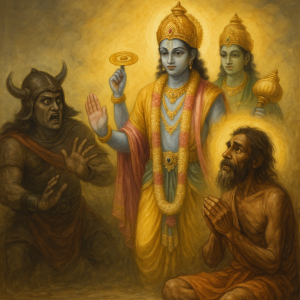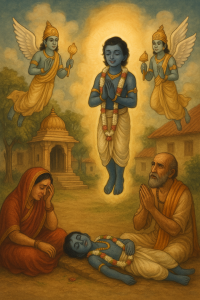The Temple Pond and Its Humble Resident
In the courtyard of a sacred Viṣṇu temple nestled in a peaceful village flowed a cool, clean pond, whose waters reflected the rising sun and echoed with the soft chanting of morning prayers. Devotees would bathe in its holy waters, collect water for offerings, and speak about the glories of the Lord near its banks.
In that same pond lived a small brown frog, unnoticed by most. While others came and went, the frog spent its entire life within earshot of kīrtana, surrounded by the fragrance of tulasī, sandalwood, and prasāda offerings floating on the water.
Though the frog never knew the meaning of the songs or the purpose of the mantras, its heart became still whenever the aarti bells rang or the conch shell blew during the deity’s worship.
A Quiet Life of Contact with the Holy
Every morning, as brāhmaṇas recited mantras and devotees sang, the frog would poke its head above the water and sit silently, gazing in the direction of the deity’s sanctum from the pond’s edge.
Sometimes it would even leap upon lotus leaves offered in worship or rest beside floating remnants of flower garlands offered to the Lord. Though no one offered it special attention, the frog became part of the daily atmosphere of worship.
Final Breath in Sacred Surroundings
One monsoon season, the water rose, and the aging frog found itself struggling to stay afloat. With its final strength, it reached the center of the pond and passed away quietly, its last breath filled with the sound of the devotees singing, “Hare Kṛṣṇa Hare Rāma.”
At that very moment, celestial beings arrived, surprising the villagers with their divine presence. They said:
“This soul, though born as a frog, lived constantly in the shelter of the Lord’s temple, bathed in the sound of His glories, and touched by the remnants of His offerings. The Lord is bound by even unintentional devotion. Now, by His mercy, this soul shall enter His eternal abode.”
And they carried the soul upward to Vaikuṇṭha.
Lessons to Be Learned:
- Association with holy places, even by residing there passively, purifies the soul.
- The power of nāma, prasāda, tulasī, and kīrtana is so strong that any living being within their reach becomes blessed.
- The Lord does not forget those who reside near His service, even if they are unconscious of Him.
- As stated in the Padma Purāṇa: “tulasī-dala-mātreṇa jalasya culukena vā / vikrīṇīte svam ātmānaṁ bhaktebhyo bhakta-vatsalaḥ”
“The Lord, being affectionately disposed toward His devotees, sells Himself for even a single tulasī leaf or a drop of water offered in devotion.”
Origin of the Story: Padma Purāṇa – Stories section highlighting the glory of simply residing near the Lord’s abode and being bathed in the atmosphere of bhakti.


